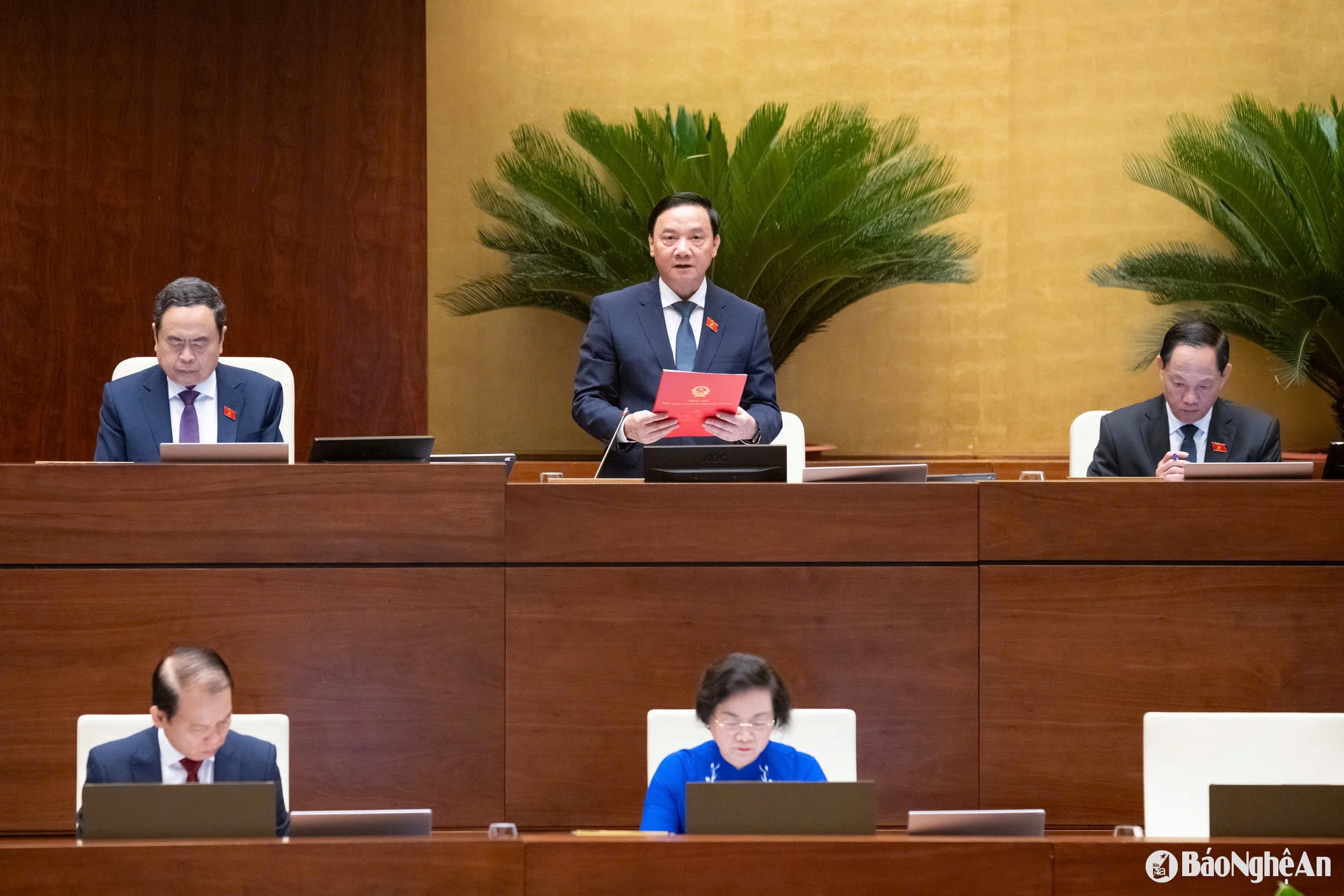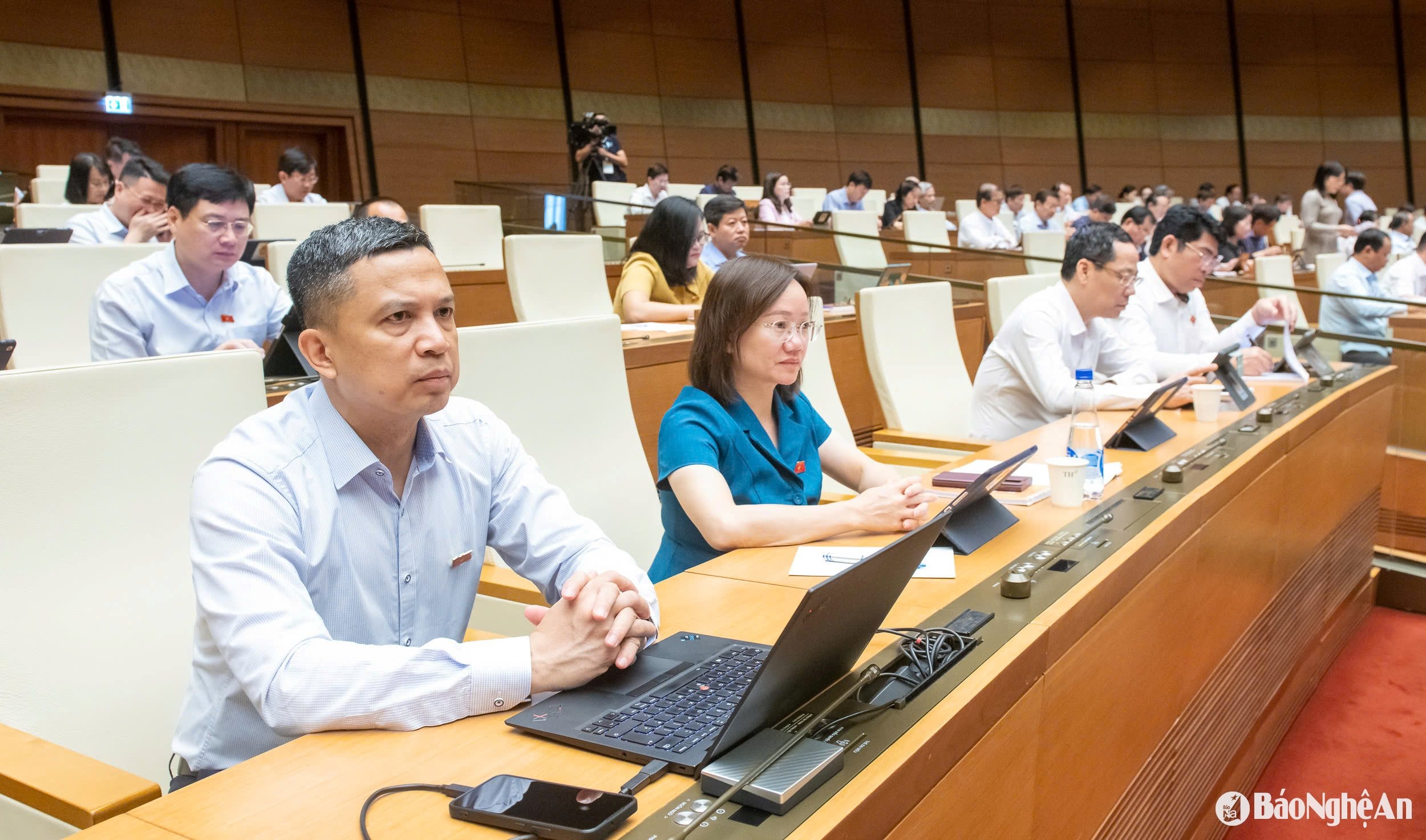The National Assembly discussed amending the Constitution to clarify the powers of local governments.
On the morning of May 14, the National Assembly discussed in the Hall the draft Resolution amending and supplementing a number of articles of the 2013 Constitution and the draft Law on Organization of Local Government (amended).

Many delegates agreed that amending the 2013 Constitution is an inevitable requirement to meet the demands of the new development stage, especially in the context of promoting the arrangement of administrative units at all levels.
This is an important legal foundation to regulate the organization of the state apparatus, ensuring constitutionality, legality and unity in the legal system.
Regarding the right to question of People's Council deputies, many opinions proposed to maintain the regulation that People's Council deputies question the Chief Justice of the People's Court and the Chief Prosecutor of the People's Procuracy. This is considered consistent with the requirement to enhance the supervisory role of local elected bodies, contributing to enhancing accountability and ensuring the right to representation of voters.
Regarding socio-political organizations, delegates agreed to continue affirming the important role of organizations under the Vietnam Fatherland Front in the political system. Many opinions suggested that it is necessary to specify more the mechanism and authority of social supervision and handling of people's petitions chaired by the Front, thereby enhancing the effectiveness of social supervision and criticism.

Discussing the draft Law on Organization of Local Government (amended), delegates said that the amendment is urgent to institutionalize the Party's major policies on perfecting the administrative apparatus. At the same time, this also aims to improve the effectiveness and efficiency of local government operations, emphasizing the central position and role of the People's Committee and People's Council in the local governance mechanism.
Some delegates pointed out the current situation in some localities where there is no district-level government organization, many tasks are being transferred to the commune level, leading to great pressure in implementation. However, the organizational capacity of the commune-level apparatus is not uniform, easily leading to overload and disruption in operation. Therefore, there needs to be a mechanism for the provincial People's Committee to monitor, support and intervene promptly when the commune level does not meet the requirements.
To meet the requirements of flexible development and management, some opinions proposed to study increasing the number of Vice Chairmen of Provincial People's Committees in areas with large populations and high workloads.
On the part of the People's Council, many delegates proposed to enhance the actual power of local state power agencies, emphasizing the role of supervision and decision-making on important issues. The draft law needs to supplement specific tasks and powers of the provincial People's Council in supervising the implementation of decentralization, delegation of authority and ensuring corresponding resources.
Some delegates proposed clearly defining the mechanism of authorizing the Standing Committee of the People's Council and the Provincial People's Committee to perform certain tasks between sessions or when an emergency arises. This will help local executive agencies be more proactive and avoid being passive in handling work.
The issue of monitoring and reflecting the will and aspirations of voters continues to be emphasized. Many opinions suggest that the law should stipulate more clearly the form, objects, and scope of supervision by the People's Council, the mechanism for handling voters' petitions, as well as sanctions for agencies and organizations that do not implement or do not fully implement the legitimate requests of the people.

One issue that received great attention was the policy for full-time People's Council delegates. Delegates said that there should be appropriate remuneration and working conditions to create motivation and ensure effectiveness in monitoring and decision-making activities at the local level.
Regarding decentralization, delegation of authority and authorization, many delegates proposed clarifying the principles, content and limits, and adding conditions to ensure implementation such as financial resources, human resources, technological infrastructure, etc. The delegation of authority needs to be linked to inspection and supervision mechanisms to ensure transparency and avoid lax management.
Some opinions suggested specifying the process of electing, dismissing, and transferring the Chairman and Vice Chairman of the Provincial People's Committee in the law to ensure consistency with Party regulations and relevant laws.
On behalf of the drafting agency, Minister of Home Affairs Pham Thi Thanh Tra said that the drafting agency has built the draft law based on four basic elements including:
Establish the legal structure of the two-level local government; inherit, supplement and clearly define the authority of decentralization, delegation and authorization; clarify the tasks and powers of each level of government in accordance with governance requirements in the new period and establish the legal basis for converting the three-level government model to two levels, associated with decentralization according to the Party's policy.
Minister Pham Thi Thanh Tra said the Government will issue 25 decrees to promptly deploy the organization of the two-level local government apparatus and effectively implement decentralization and delegation of authority.
.jpg)
In his concluding remarks, Vice Chairman of the National Assembly Nguyen Khac Dinh affirmed that the National Assembly Standing Committee will fully synthesize the opinions of the delegates so that relevant agencies can absorb, explain and revise the draft law. Particularly for the draft amending and supplementing a number of articles of the 2013 Constitution, the Drafting Committee for amending and supplementing a number of articles of the Constitution will hold meetings to absorb opinions from group discussions, in the hall and comments from the people, and complete it for submission to the National Assembly for consideration and decision.
